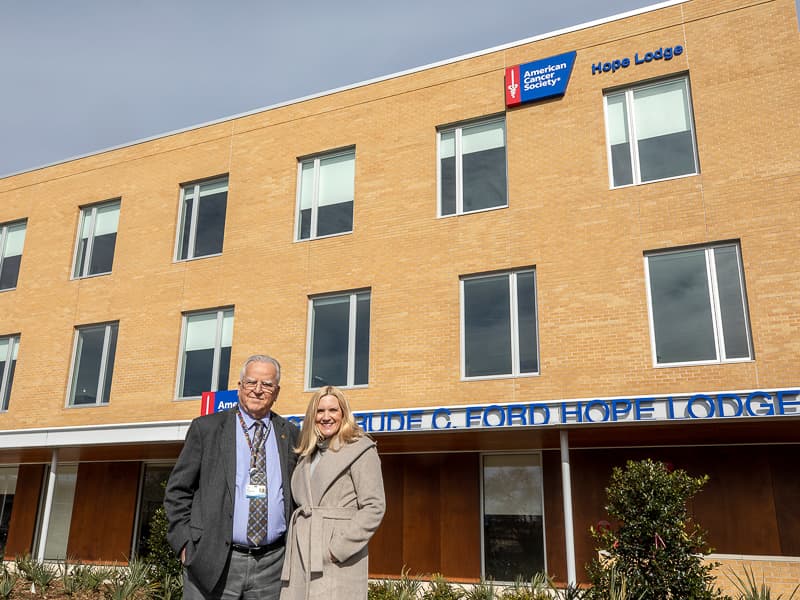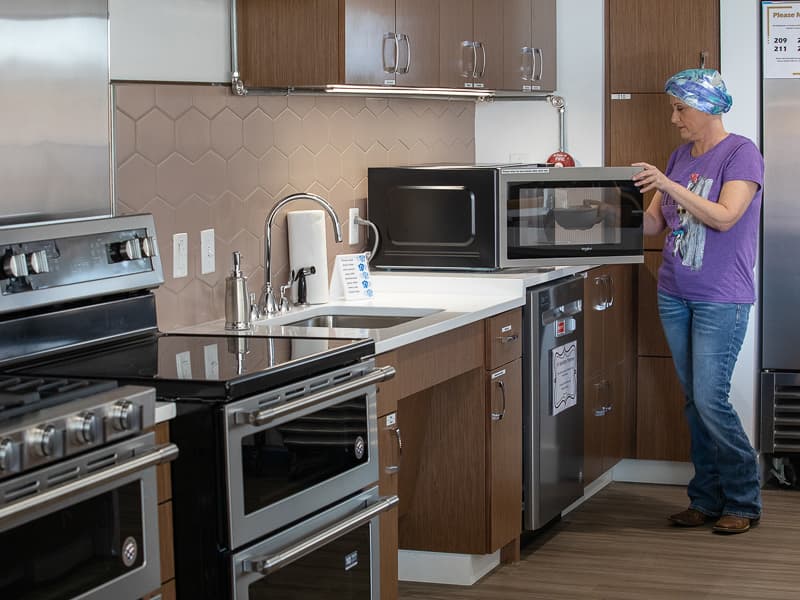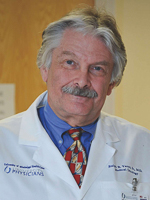Hope Lodge goal: Patients more focused on their cancer fight
Published on Thursday, March 28, 2019
By: Cynthia Wall
With the Gertrude C. Ford Foundation Hope Lodge grand opening today, it fulfills a dream that started in 2004.
“The need for lodging is evident,” said Dr. John Ruckdeschel, director of the Cancer Institute at the University of Mississippi Medical Center.
“More than half the patients treated at UMMC travel 50 miles or more for their cancer care,” said Ruckdeschel, professor of medicine and a medical oncologist in the Interdisciplinary Thoracic Program.
 Dr. John Ruckdeschel, UMMC Cancer Institute director, and Allison Tyler, executive director of the American Cancer Society South Region, poses for a picture in front of the Hope Lodge.
Dr. John Ruckdeschel, UMMC Cancer Institute director, and Allison Tyler, executive director of the American Cancer Society South Region, poses for a picture in front of the Hope Lodge.The American Cancer Society lodge, located across the street from UMMC main Jackson campus, joins about 30 such lodges nationwide in offering help to cancer patients who must travel to seek treatment.
For Misty Hall, a patient at the UMMC Cancer Institute, the Ford Hope Lodge is a gift in her battle against cancer.
Hall, diagnosed in January with triple negative breast cancer, chose to seek treatment at the Cancer Institute because she wanted to work with doctors who see multiple cases of this unusual type of breast cancer and wanted access to clinical trials if needed and if appropriate.
“I’m grateful for Hope Lodge because I would be spending a whole lot more money running back and forth or paying for a hotel room,” said Hall, who lives in Houston in Chickasaw County.
Her drive, about 2 and a half to three hours, can be tiring for patients after a day of appointments and treatment. Staying overnight in a motel becomes expensive.
For Hall, a long-time hair stylist, humor also helps ease the cancer burden.

Hall tries out the microwave at the new Ford Hope Lodge.
“If I need to, I could even go in the kitchen and cook a meal,” she said, pausing and then laughing. “You know I don’t cook. People who know me won’t believe that.”
Whether she cooks or not, the Ford Hope Lodge staff aim to provide the comforts of home from help loading an address into a GPS to online research that may help their guests.
The 32-room Ford Hope Lodge provides cancer patients a private room with two beds and a bathroom. The Lodge also includes a family-style kitchen with cubbies and refrigerator and freezer space for those visiting to store foods and cook meals.
The Lodge also offers two dining area, a fitness area, library, prayer room, two outdoor spaces and small balconies on floors with the rooms, and a lounging area on those floors.
Patients are offered free transportation to and from treatment at Jackson health care facilities.
The Ford Hope Lodge cost about $10.9 million to construct. Now the ACS is seeking donations to aid in its continued operation. The ACS estimates:
- About 1,500 patients travel to the Jackson area annually to receive cancer treatment.
- The Lodge will provide nearly 12,000 nights of lodging per year to patients and their caregivers, saving them $1.5 million.
- The ACS will provide about 5,000 trips to and from treatment, saving patients some $50,000 in transportation costs.
The official ACS campaign began in 2011, said Robert Morris, ACS vice president for community development.
For Ruckdeschel, the need for a Hope Lodge has been evident since his sister was treated for breast cancer when he was leading the Moffitt Cancer Center in Tampa, Fla.
“We had a large, boisterous family descend on our house for weeks on end,” Ruckdeschel said. “Our lives and theirs were totally disrupted by the process. Right then, I became convinced of the need for a Hope Lodge.”
Working with others in Tampa, he helped build one for patients who may not have relatives with whom to stay.
 Vance
VanceDr. Ralph Vance, who retired as a UMMC medical oncologist in 2011, said that while he served as American Cancer Society national president, he noticed Mississippi and Arkansas were the only two mid-South states with no Hope Lodge. He was among the early champions who worked to build one.
He knows firsthand the expense of travel. He remembers his father having to stay in a hospital in Birmingham for six months. “We had great insurance but no one paid for a hotel room,” he said. “It’s costly and precludes some people from getting treatment.”
“It’s such a blessing to have this come to fruition,” he said recently from his home in Oxford.